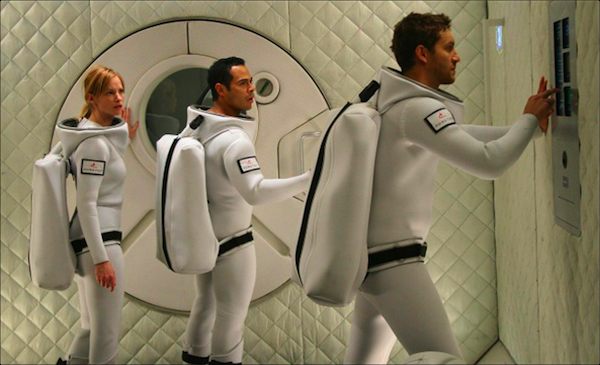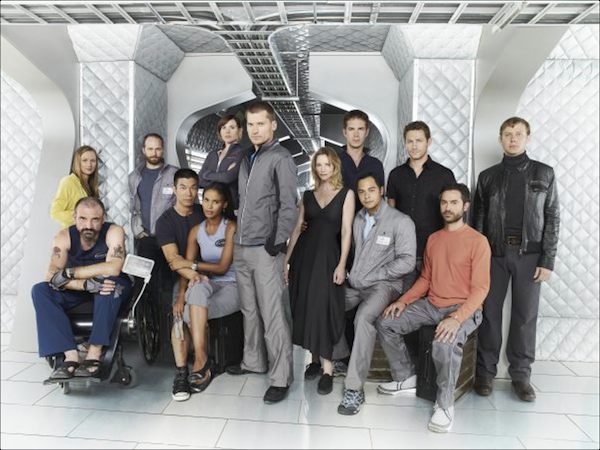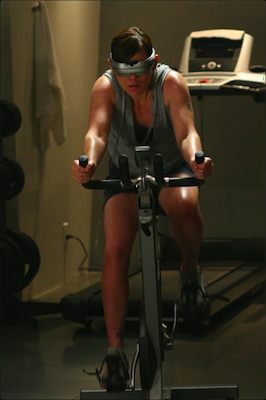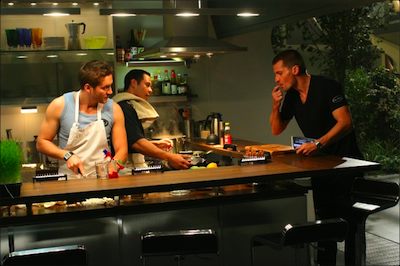I finally managed to write-up the interview with Ron D Moore from last Thursday. This was the first time ever I participated in such a conference call, so it was exciting to experience it all. Basically anybody was allowed to ask questions, so there was a great mix of different type of topics Moore talked about. I cut out some of the questions that I didn’t find that interesting, but it still turned out to be quite a lengthy interview. So: I’ve cut it in two. Here’s the first part, later today I’ll post the second part:
Q: Ron, one of the biggest questions people keep asking me about Virtuality is how is it different from on Star Trek when you would have holodeck episodes and people would get lost in the holodeck. How is this different from that sort of scenario?
Ron Moore: Well, it’s a different concept. The holodeck is a physical space that you would go into and three dimensional forms were actually physically created in front of you that you could feel and touch and interact with, etc. The computer would generate them as long as you were in them. This is truly a virtual space, which is much more akin to putting on contemporary, sort of virtual headsets, but sort of taking it to the next level where you do have an experiential sort of ability to touch and sense and taste and smell things in your mind, so it’s different sort of on the mechanical level.
In terms of the story level, we’re not playing the idea that if you die in the virtual space you die in the real space. It’s not … from that sense. It doesn’t have the safety programs like it did in the holodeck where the safety is off and if you get killed in here you get killed. It’s a very different thing.
Q: So in Virtuality if you die inside the virtual headset you don’t die in reality or you do?
Ron Moore: You don’t. No. It’s more like how gaming is now. You go on-line. You play a game and you get killed and you’re kicked out of the program because you’re dead, but you’re not dead in real life.
We’re using these much more psychologically as well. It doesn’t sound like you’ve seen the pilot, but essentially the experience is that the astronauts aboard the Phaeton have, in virtual space, are sort of things that just sort of are psychologically motivated. They go in there and they do things for entertainment and to sort of pass the time of day while they’re on this very, very long-range mission, but you’re learning things about them personally and about where did they want to spend their time and when things go wrong in that space how does it then influence them in the real world. That was the thing I was most interested in.
The concept was how the virtual space impacted the real story that was going on aboard the spacecraft and vice-versa. What’s the sort of interaction between the two?

Q: My question is sort of following up on that, but comparing it to Battlestar. The nature of Battlestar, you had to be very serious dealing with the space ship and everything. Does Virtuality allow you to have a little bit more fun with the concept of people in space?
Ron Moore: Oh, yes. It’s a much less serious situation than Battlestar was dealing with. Battlestar was literally a post-apocalyptic show where the future of humanity rode on their every decision and death was stalking them continuously. So it’s not set up in the same way. The crew aboard Phaeton signed up for what just seemed like a very straight-ahead mission of exploration and they were chosen with that in mind. They were also chosen to participate in this sort of reality show that’s being broadcast back to Earth.
So there was a conscious attempt on the part of the people who put the crew together to sort of have an interesting mix of people. There are debates within the crew themselves who was chosen just for sort of their demographic content and who was legitimately supposed to be there. Now you’ve got a groups of 12 people stuck in a metal tube going in a straight line for a decade or so and that’s going to just sort of produce a lot of tensions and frictions and manipulations and sort of cross problems between the characters. It has a stronger element of fun and suspense and sort of interesting plot terms in terms of what characters will do with one another than did Battlestar. Battlestar was very driven by the internal pressures of the huge weight that was on all of their shoulders from the beginning of the miniseries.
Q: So a little more opportunity for humor maybe?
Ron Moore: Oh, yes. There’s definitely more humor. There’s more humor probably in the first ten minutes of Virtuality than there was in the run of Battlestar, let’s put it that way.
Q: When did you come up with the idea of blending a sci-fi thriller with a reality show element to it?
Ron Moore: It was sort of in stages. When we first started talking about the concept it was about a long-range space mission, which I was intrigued with. Like I said before, I was interested in the idea of what do you do with 12 people in a metal tube for that long. I thought there were interesting dramatic possibilities right there and, okay, what would they realistically need to do. What would NASA or the space confederation do at that point to keep them from going crazy? They’d probably have a really advanced virtual reality program to help them while away the hours and there’s interaction between those two worlds.
Somewhere in those discussions we started talking about when they would be broadcasting pieces back to earth, obviously, like astronauts do today, and hey, what if they made a reality show out of that? Then it all kind of started to come together. You had these three layers of storytelling going on in the show where you had what was happening in the real world on the ship, what was happening in the virtual space and then what was the reality show that was seen back on earth. Were the needs of the reality show starting to impact what was happening on the spacecraft? Were people being manipulated in order to make better drama for the reality show? The astronauts themselves would start to wonder about are they telling us the truth about what’s happening back on earth or is that something to just get us to be upset for the cameras. It did sort of become this really interesting sort of psychological crucible that they would all be put in.
Q: It sounds like there’s a lot going on, because you have the mission to save earth. You have the virtual reality module. You have the virus. Then you have the streaming reality show. When you were writing it were there any major hurdles or blind alleys? Did it get confusing?
Ron Moore: Yes. I mean it was a tough thing to juggle. It’s a very ambitious piece and I think that was the reaction on the part of Fox when they saw it. It’s a very challenging, very complicated piece of work and there are a lot of moving parts. We knew that sort of going in and writing the script wasn’t easy. There was a lot of sort of trying to decide how much time you spend in any one of these three categories and at what point do you shift from the audience’s point of view from one to the other. What’s the language for that? Where are we going to introduce certain characters? How often do you go to the first person confessionals and the reality show, etc., etc.? So there were a lot of just complicated questions. Then those same questions were there in the editing process. When do you go to which piece of material? I think it was a really interesting challenge.

Q: Is all of the VR avatar style characters or is it real looking people?
Ron Moore: The actors play themselves in the virtual space. What we did in production was all of the virtual reality scenes are shot in green screen and all of the sets are green-scene sets, so for instance, the piece opens with an extended sort of piece in a virtual space of the Civil War for the lead character. None of that was shot on location. None of it was a set that we built. It was all done in the computer on a green screen stage. We kept that language for all of the virtual pieces to sort of give all of the virtual reality a sense of continuity so that you always sort of intuitively felt that you were in a virtual space even if the background looked photo reeled, so all of that is done against green.
Q: I was at Comicon last year for TV Guide and I understood that this was originally supposed to be a pilot for a series, right?
Ron Moore: It is a pilot. It’s a pilot for a series and Fox is going to broadcast it as a two-hour movie. It was a two-hour pilot, so they’re broadcasting it as a two-hour movie, but in my mind it’s a pilot. It’s always been a pilot.
Q: So it still can become a series?
Ron Moore: I think you never say never. They haven’t picked it up to date. Their attitude, I think, is kind of wait and see. I think they want to see what the reaction is going to be. What are the critics going to say? Is it going to get word of mouth? Are fans going to gravitate to it or is the science fiction community really going to turn up for it? Is there going to be a certain buzz and excitement? I think right now it doesn’t look like it’s going to series, but I think if enough people watched and enough people got excited about it anything is possible.
Q: Do you think this is a story that can be told in two hours?
Ron Moore: Well, you’ll see. It certainly does not resolve itself in two hours. I mean it sets up for a show, so it’s got some pretty heavy things that go down in it and kind of leaves you going, “Whoa! Where is that going?” by the end of it.
Q: Just going back to the whole reality TV, which you use as a story point in this film, why do you think people have become so obsessed with reality TV? What’s the attraction to it? What made you want to include it in this particular story?
Ron Moore: The first are two kind of complicated questions and I’m not sure what the answers are. At first I think I was certainly one of the skeptics that reality TV was going to be with us for any great period of time. Certainly, that’s been proven wrong. There seems to be a fundamental interest of people watching other real people or at least what they perceive as real people as opposed to watching fictional programming. There’s certainly something. There’s a powerful draw there of us wanting to look in on other people’s lives and seeing them pretty much as they actually exist.
Why we include it in the show was it just felt like it’s become such a staple of pop culture at this point in time. It seemed interesting to then incorporate it into a science fiction setting, which was something that we had never seen before or heard of and thought that’s an interesting sort of spin on it. We’ve all seen video that’s been broadcast back by the astronauts from the Apollo missions to the Space Shuttle, but we’ve never seen it done in a format where it’s trying to be a reality show at the same time. I thought that’s an interesting challenge. It’s kind of a different hook for the audience and it might be kind of a cool angle for the show.
Come back later for Part 2 of this interview.
Virtuality premieres on Friday 26th June at 8.00pm on Fox.








